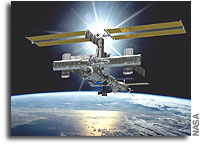NASA Space Station On-Orbit Status 16 Jan 2004

All ISS systems continue to function nominally, except as noted previously or below.
FE Alexander Kaleri worked on the SVO water supply system in the Service Module (SM), to connect it, with the GZhS air/liquid separator system, to the Elektron, after the successful replacement of the BZh fluid unit on 1/12.
CDR Michael Foale terminated the 24-hour discharging process for spacesuit (EMU) batteries #2032 and #2033 in the Airlock (A/L)’s battery stowage assembly (BSA), then stowed them in the A/L after resetting their 50-day clock.
Kaleri performed the regular routine maintenance of SOZh life support systems and conducted his regular weekly IMS (inventory management system) tagup with IMS specialists at MCC-M, discussing open issues concerning identification of equipment and storage locations for the IMS databases. [Issues today included trash container stowage, cables for the Kurs antenna connection, and the stowage location of the large ESA flag.]
The crew spent part of the day with transfers of crew preference items to the Russian segment (RS) in preparation for tonight’s isolation of the RS from the U.S. segment (USOS).
The ground commanded a “zero” calibration of the MCA (major constituent analyzer) for subsequent rapid sampling of the cabin air.
Also ground-commanded was a repressurization of the station with nitrogen (N2) from the Airlock HPGT (high-pressure gas tank) supply via the Lab PCA (pressure control assembly), i.e., before the USOS isolation. The repress to a target pressure of 750 mmHg (14.5 psi) was estimated to take ~3h 45 min, using up to 50 lb of N2 (whichever was less). [Both RSC-Energia and NASA had agreed to the repress at the MMT (Mission Management Team).]
The crew worked out on TVIS treadmill, RED exerciser and VELO cycle with load trainer.
Sasha transferred data files from the physical exercise equipment to the MEC (medical equipment computer) via memory card and RED log entries, for downlink on OCA comm. Subsequently, he performed the periodic transfer of accumulated data files from the wristband HRM (heart rate monitor) receiver stations to the MEC for downlink, then deleting them on the HRM.
Two additional hard drives of the PCS (portable computer system) were “ghosted” (reformatted & loaded with approved software) yesterday. This brings the total available spare hard drives to three.
The crew is to move to the RS at ~12:45pm EST for their temporary stay, followed by hatch closure between FGB and PMA-1, then between SM and FGB at ~1:55pm to isolate RS from USOS. [Prior to hatch closure, the crew will remove the air duct between Node and FGB, take pressure measurements in the FGB and turn off the FGB lights. FGB pressure will be monitored from the SM periodically during the isolation (4 times a day).]
Since the OpsLAN (operations local area network) cable between the segments had to be disconnected, some functions will not be available to the crew during the isolation period. [This includes no access to file server, execute package, timeline, IMS, email, IP phone, video teleconferencing and others.]
Sleep time begins at the usual 4:30pm.
Today’s CEO targets, in the current XPOP attitude constrained by flight rule to fewer near-vertical targets due to Lab window shutter closure and current condensation-prevention plan (see above), wereKerguelen Is., Indian Ocean (Dynamic event. Nadir pass over this remote island archipelago, a dependency of France [Territory of the French Southern and Antarctic Lands]. The main island supports an ice field and several glaciers and a large penguin colony, but no permanent human inhabitants or trees), Perth, Australia(looking left for this major city in Western Australia. This city of 1.3 million lies inland of its port Freemantle on the Swan River. Perth is 4400 km by road from Sydney), Plankton, S Atlantic (Dynamic event. Possible opportunity, between clouds, to document evolution of the large bloom you imaged last week),Icebergs, S Atlantic (Dynamic event. Possible opportunity to document movement of the two large ice masses imaged last week. If possible, the crew was to include the coast of South Georgia island), Limpopo delta, Mozambique (Dynamic event. Another sunglint opportunity to image the entire large delta that makes up the great southern bulge of Mozambique), andPatagonian Glaciers (PRIORITY (400mm-lens). Opportunity to continue CEO efforts for detailed imagery of the southern Andean glaciers: clear weather on the northeast side of the ice field. Recent CEO images are some of the clearest received this mission).
CEO images can be viewed at the websites.
See also the website “Space Station Challenge” at
ISS Orbit (as of this morning, 7:03am EST [= epoch]):
Mean altitude — 370.6 km
Apogee — 376.0 km
Perigee — 365.2 km
Period — 91.9 min.
Inclination (to Equator) — 51.63 deg
Eccentricity — 0.0007983
Orbits per 24-hr. day — 15.66
Mean altitude loss last 24 hours — 150 m
Revolutions since FGB/Zarya launch (Nov. ’98) — 29436
For more on ISS orbit and worldwide ISS naked-eye visibility dates/times, see
http://www.hq.nasa.gov/osf/station/viewing/issvis.html








